- Home
- Anthony Ryan
The Pariah Page 2
The Pariah Read online
Page 2
The royal messenger was a thin-faced man clad in finely tailored jerkin and trews with a long cloak dyed to mirror the royal livery. Seated upon a grey stallion, he maintained an expression of disdainful affront even as Deckin moved to grasp the bridle of his horse. For all his rigid dignity and evident outrage, he was wise enough not to lower the lance he held, the royal pennant continuing to stand tall and flutter above this scene of recent slaughter.
“Any violence or obstruction caused to a messenger in Crown service is considered treason,” the thin-faced fellow stated, his voice betraying a creditably small quaver. He blinked and finally consented to afford Deckin the full force of his imperious gaze. “You should know that, whoever you are.”
“Indeed I do, good sir,” Deckin replied, inclining his head. “And I believe you know full well who I am, do you not?”
The messenger blinked again and shifted his eyes away once more, not deigning to answer. I had seen Deckin kill for less blatant insults, but now he just laughed. Raising his free hand, he gave a hard, expectant snap of his fingers.
The messenger’s face grew yet more rigid, rage and humiliation flushing his skin red. I saw his nostrils flare and lips twitch, no doubt the result of biting down unwise words. The fact that he didn’t need to be asked twice before reaching for the leather scroll tube on his belt made it plain that he certainly knew the name of the man before him.
“Lorine!” Deckin barked, taking the scroll from the messenger’s reluctant hand and holding it out to the slim, copper-haired woman who strode forwards to take it.
The balladeers would have it that Lorine D’Ambrille was the famously fair daughter of a distant lordling who fled her father’s castle rather than suffer an arranged marriage to a noble of ill repute and vile habits. Via many roads and adventures, she made her way to the dark woods of the Shavine Marches where she had the good fortune to be rescued from a pack of ravening wolves by none other than the kindly rogue Deckin Scarl himself. Love soon blossomed betwixt them, a love that, much to my annoyance, has echoed through the years acquiring ever more ridiculous legend in the process.
As far as I have been able to ascertain there was no more noble blood in Lorine’s veins than mine, although the origin of her comparatively well-spoken tones and evident education are still something of a mystery. She remained a cypher despite the excessive time I would devote to thinking of her. As with all legends, however, a kernel of truth lingers: she was fair. Her features held a smooth handsomeness that had survived years of forest living and she somehow contrived to keep her lustrous copper hair free of grease and burrs. For one suffering the boundless lust of youth, I couldn’t help but stare at her whenever the chance arose.
After removing the cap from the tube to extract the scroll within, Lorine’s smooth, lightly freckled brow creased a little as she read its contents. Captured as always by her face, my fascination was dimmed somewhat by the short but obvious spasm of shock that flickered over her features. She hid it well, of course, for she was my tutor in the arts of disguise and even more practised than I in concealing potentially dangerous emotions.
“You have it all?” Deckin asked her.
“Word for word, my love,” Lorine assured him, white teeth revealed in a smile as she returned the scroll to the tube and replaced the cap. Although her origins would always remain in shadow, I had gleaned occasional mentions of treading stages and girlhood travels with troupes of players, leading me to conclude that Lorine had once been an actress. Perhaps as a consequence, she possessed the uncanny ability to memorise a large amount of text after only a few moments of reading.
“If I might impose upon your good nature, sir,” Deckin told the messenger, taking the tube from Lorine. “I would consider it the greatest favour if you could carry an additional message to King Tomas. As one king to another, please inform him of my deepest and most sincere regrets regarding this unfortunate and unforeseen delay to the journey of his trusted agent, albeit brief.”
The messenger stared at the proffered tube as one might a gifted turd, but took it nonetheless. “Such artifice will not save you,” he said, the words clipped by his clenched teeth. “And you are not a king, Deckin Scarl.”
“Really?” Deckin pursed his lips and raised an eyebrow in apparent surprise. “I am a man who commands armies, guards his borders, punishes transgressions and collects the taxes that are his due. If such a man is not a king, what is he?”
It was clear to me that the messenger had answers aplenty for this question but, being a fellow of wisdom as well as duty, opted to offer no reply.
“And so, I’ll bid you good day and safe travels,” Deckin said, stepping back to slap a brisk hand to the rump of the messenger’s horse. “Keep to the road and don’t stop until nightfall. I can’t guarantee your safety after sunset.”
The messenger’s horse spurred into a trot at the slap, one its rider was quick to transform into a gallop. Soon he was a blur of churned mud, his trailing cloak a red and gold flicker among the trees until he rounded a bend and disappeared from view.
“Don’t stand gawping!” Deckin barked, casting his glare around the band. “We’ve got loot to claim and miles to cover before dusk.”
They all fell to the task with customary enthusiasm, the archers claiming the soldiers they had felled while the others swarmed the cart. Keen to join them, I looked around for a sapling where I could tether my stolen horse but drew up short as Deckin raised a hand to keep me in place.
“Just one cut,” he said, coming closer and nodding his shaggy head at the slain soldier with the whip. “Not bad.”
“Like you taught me, Deckin,” I said, offering a smile. I felt it falter on my lips as he cast an appraising eye over the horse and gestured for me to pass him the reins.
“Think I’ll spare him the stewpot,” he said, smoothing a large hand over the animal’s grey coat. “Still just a youngster. Plenty of use left in him. Like you, eh, Alwyn?”
He laughed one of his short, grating laughs, a sound I was quick to mimic. I noticed Lorine still stood a short way off, eschewing the frenzied looting to observe our conversation with arms crossed and head cocked. I found her expression strange; the slightly pinched mouth bespoke muted amusement while her narrowed gaze and drawn brows told of restrained concern. Deckin tended to speak to me more than the other youngsters in the band, something that aroused a good deal of envy, but not usually on Lorine’s part. Today, however, she apparently saw some additional significance in his favour, making me wonder if it had something to do with the contents of the messenger’s scroll.
“Let’s play our game, eh?” Deckin said, instantly recapturing my attention. I turned back to see him jerk his chin at the bodies of the two soldiers. “What do you see?”
Stepping closer to the corpses, I spent a short interval surveying them before providing an answer. I tried not to speak too quickly, having learned to my cost how much he disliked it when I gabbled.
“Dried blood on their trews and cuffs,” I said. “A day or two old, I’d say. This one—” I pointed at the soldier with the arrowhead jutting from his mouth “—has a fresh-stitched cut on his brow and that one.” My finger shifted to the half-bared blade still clutched in the gloved fist of the one I had stabbed. “His sword has nicks and scratches that haven’t yet been ground out.”
“What’s that tell you?” Deckin enquired.
“They’ve been in a fight, and recently.”
“A fight?” He raised a bushy eyebrow, tone placid as he asked, “You sure it was just that?”
My mind immediately began to race. It was always a worrisome thing when Deckin’s tone grew mild. “A battle more like,” I said, knowing I was speaking too fast but not quite able to slow the words. “Something big enough or important enough for the king to be told of the outcome. Since they were still breathing, until this morn, I’d guess they’d won.”
“What else?” Deckin’s eyes narrowed further in the manner that told of potential disappointment
; apparently, I had missed something obvious.
“They’re Cordwainers,” I said, managing not blurt it out. “Riding with a royal messenger, so they were called to the Shavine Marches on Crown business.”
“Yes,” he said, voice coloured by a small sigh that told of restrained exasperation. “And what is the Crown’s principal business in these troubled times?”
“The Pretender’s War.” I swallowed and smiled again in relieved insight. “The king’s host has fought and won a battle with the Pretender’s horde.”
Deckin lowered his eyebrow and regarded me in silence for a second, keeping his unblinking gaze on me just long enough to make me sweat for the second time that morning. Then he blinked and turned to lead the horse away, muttering to Lorine as she moved to his side. The words were softly spoken but I heard them, as I’m sure he intended I would.
“The message?”
Lorine put a neutral tone to her reply, face carefully void of expression. “You were right, as usual, my love. The daft old bastard turned his coat.”
Deckin ordered the bodies cleared from the road and dumped deeper in the forest where the attentions of wolves, bears or foxes would soon ensure all that remained were anonymous bones. The Shavine Forest is a hungry place and fresh meat rarely lasts long when the wind carries its scent through the trees. It had been dispiritingly inevitable that it would be Erchel who found one of them still alive. He was just as hungry as any forest predator, but it was hunger of a different sort.
“Fucker’s still breathing!” he exclaimed in surprised delight when the crossbowman we had been dragging through the ferns let out a confused, inquisitive groan. Jarred by the unexpectedness of his survival, I instantly let go of his arm, letting him slump to the ground, where he continued to groan before raising his head. Despite the holes torn into his body by no fewer than five arrows, he resembled a man woken from a strange dream as he gazed up at his captors.
“What’s happened, friend?” Erchel enquired, sinking to his haunches, face drawn in an impressive semblance of concern. “Outlaws, was it? My fellows and I found you by the road.” His face became grim, voice taking on a hoarse note of despair. “What a terrible thing. They’re naught but beasts, Scourge take them. Don’t worry—” He set a comforting hand on the crossbowman’s lolling head. “—We’ll see you right.”
“Erchel,” I said, voice edged with a forbidding note. His eyes snapped to meet mine, catching a bright, resentful gleam, sharp, pale features scowling. We were much the same age but I was taller than most lads of seventeen, if that was in fact my age. Even today I can only guess my true span of years, for such is the way with bastards shucked from a whorehouse: birthdays are a mystery and names a gift you make to yourself.
“Got no time for your amusements,” I told Erchel. The aftertaste of murder tended to birth a restless anger in me and the exchange with Deckin had deepened the well, making my patience short. The band had no formal hierarchy as such. Deckin was our unquestioned and unchallenged leader and Lorine his second, but beneath them the pecking order shifted over time. Erchel, by dint of his manners and habits, foul even by the standards of outlaws, currently stood a good few pegs lower than me. Being as much a pragmatic coward as he was a vicious dog, Erchel could usually be counted on to back down when faced with even marginally greater authority. Today, however, the prospect of indulging his inclinations overrode his pragmatism.
“Get fucked, Alwyn,” he muttered, turning back to the crossbowman who, incredibly, had summoned the strength to try and rise. “Don’t tax yourself, friend,” Erchel advised, his hand slipping to the knife on his belt. “Lay down. Rest a while.”
I knew how this would go from here. Erchel would whisper some more comforting endearments to this pitiable man, and then, striking swift like a snake, would stab out one of his eyes. Then there would be more cooing assurances before he took the other. After that it became a game of finding out how long it took the benighted wretch to die as Erchel’s knife sliced ever deeper. I had no stomach for it most days, and certainly not today. Also, he had failed to heed me which was justification enough for the kick I delivered to his jaw.
Erchel’s teeth clacked as his head recoiled from the impact. The kick was placed to cause the most pain without dislocating his jaw, not that he appreciated my consideration. Just a scant second or two spent blinking in shock before his narrow face mottled in rage and he sprang to his feet, bloodied teeth bared, knife drawn back to deliver a reply. My own knife came free of the sheath in a blur and I crouched, ready to receive him.
In all honesty, the matter might have been decided in favour of either of us, for we were about evenly matched when it came to knife work. Although, I like to think my additional bulk would have tipped the scales in my direction. But it all became moot when Raith dropped the body he had been carrying, strode between us and crouched to drive his own knife into the base of the crossbowman’s skull.
“To be wasteful of time is to be wasteful of life,” he told us in his strange, melodious accent, straightening and directing a steady, unblinking stare at each of us in turn. Raith possessed a gaze I found hard to meet at the best of times, the overly bright blue eyes piercing in a way that put one in mind of a hawk. Also, he was big, taller and broader even than Deckin but without any sign of a belly. More off-putting still were the livid red marks that formed two diagonal stripes across the light brown skin of his face. Before clapping eyes on him during my first faltering steps into Deckin’s camp, I hadn’t beheld one of Caerith heritage before. The sense of strangeness and threat he imbued in me that day had never faded.
In those days, tales of the Caerith and their mysterious and reputedly arcane practices abounded. Never a common sight in Albermaine, those who lived among us were subject to the fear and derision common to those viewed as alien or outlandish. Experience would eventually teach us the folly of such denigration, but all that was yet to come. I had heard many a lurid yarn about the Caerith, each filled with allusions to witchy strangeness and dire fates suffered by Covenant missionaries who unwisely crossed the mountains to educate these heathen souls in the Martyrs’ example. So, I was quick to avert my eyes while Erchel, ever cunning but rarely clever, was a little slower, prompting Raith to afford him the benefit of his full attention.
“Wouldn’t you agree, weasel?” he asked in a murmur, leaning closer, the brown skin of his forehead briefly pressing against Erchel’s pale brow. As the bigger man stooped, his charm necklace dangled between them. Although just a simple length of cord adorned with bronze trinkets, each a finely wrought miniature sculpture of some kind, the sight of it unnerved me. I never allowed my gaze to linger on it too long, but my snatched glances revealed facsimiles of the moon, trees and various animals. One in particular always caught my eye more than the others: the bronze skull of a bird I took to be a crow. For reasons unknown, the empty eye sockets of this artefact invoked more fear in me than its owner’s unnaturally bright gaze.
Raith waited until Erchel gave a nod, eyes still lowered. “Put it over there,” the Caerith said, nodding towards a cluster of elm a dozen paces away as he slowly wiped his bloodied blade on Erchel’s jerkin. “And you can carry my bundle on the way back. Best if I don’t find anything missing.”
“Caerith bastard,” Erchel muttered as we heaved the crossbowman’s corpse into the midst of the elm. As was often his way, our confrontation now appeared to have been completely forgotten. Reflecting on his eventual fate all these years later I am forced to the conclusion that Erchel, hideous and dreadful soul that he was, possessed a singular skill that has always eluded me: the ability to forgo a grudge.
“They’re said to worship trees and rocks,” he went on, careful to keep his voice low. “Perform heathen rights in the moonlight and such to bring them to life. My kin would never run with one of his kind. Don’t know what Deckin’s thinking.”
“Mayhap you should ask him,” I suggested. “Or I can ask him for you, if you like.”
This
blandly spoken offer had the intended effect of keeping Erchel’s mouth closed for much of the remainder of our journey. However, as we progressed into the closer confines of the deep forest, drawing nearer to camp, his tongue invariably found another reason to wag.
“What did it say?” he asked, once again keeping his voice quiet for Raith and the others weren’t far off. “The scroll?”
“How should I know?” I replied, shifting the uncomfortable weight of the loot-filled sack on my shoulder. The bodies had all been stripped clean before I could join in the scavenging, but the cart had yielded half a meal sack, some carrots and, most prized of all, a pair of well-made boots which would fit me near perfectly with a few minor alterations.
“Deckin talks to you. So does Lorine.” Erchel’s elbow nudged me in demanding insistence. “What could it say that would make him risk so much just to read it?”
I thought of the spasm of shock I had seen on Lorine’s face as she read the scroll, as well as her contradictory expression as she stood and watched Deckin coax deductions from me. The daft old bastard turned his coat, she had said. My years in this band had given me a keen nose for a shift in the varied winds that guided our path, Deckin always being the principal agent. Never fond of sharing his thoughts, he would issue commands that seemed odd or nonsensical only for their true intent to stand revealed later. So far, his guarded leadership had always led us to profit and clear of the duke’s soldiers and sheriffs. The duke…
My feet began to slow and my eyes to lose focus as my always-busy mind churned up an insight that should have occurred to me back at the road. The messenger’s guards were not ducal levies from the Shavine Marches but Cordwainers fresh from another battle in the Pretender’s War. Soldiers in service to the king, which begged the question: if his own soldiers couldn’t be trusted with escorting a Crown agent, which side had the Duke of the Shavine Marches been fighting on?

 Raven’s Shadow Book One: Blood Song (Raven's Shadow)
Raven’s Shadow Book One: Blood Song (Raven's Shadow)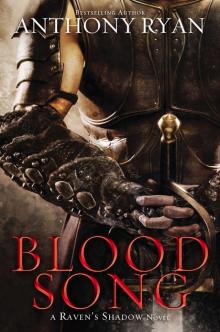 Blood Song
Blood Song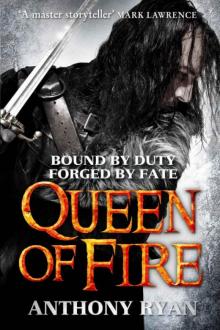 Queen of Fire
Queen of Fire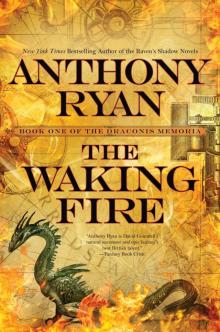 The Waking Fire
The Waking Fire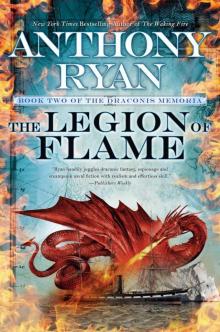 The Legion of Flame
The Legion of Flame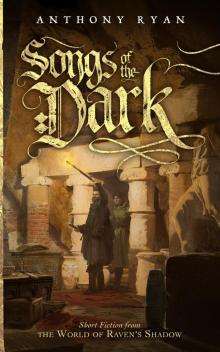 Songs of the Dark
Songs of the Dark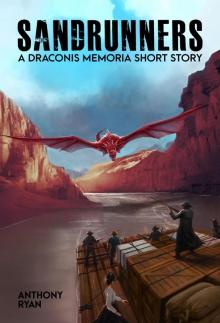 Sandrunners--A Draconis Memoria Short Story
Sandrunners--A Draconis Memoria Short Story Slab City Blues
Slab City Blues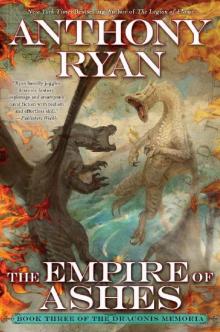 The Empire of Ashes
The Empire of Ashes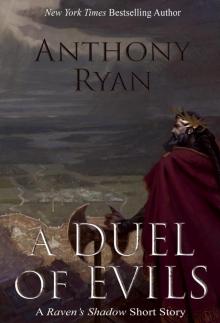 A Duel of Evils
A Duel of Evils The Pariah
The Pariah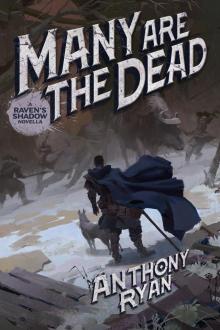 Many Are the Dead
Many Are the Dead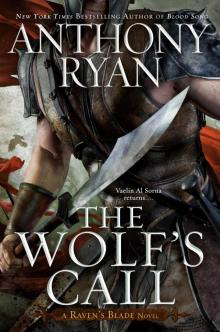 The Wolf's Call
The Wolf's Call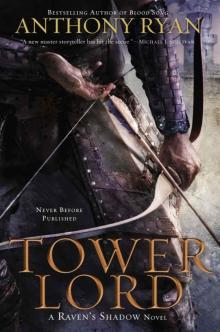 Tower Lord (A Raven's Shadow Novel)
Tower Lord (A Raven's Shadow Novel)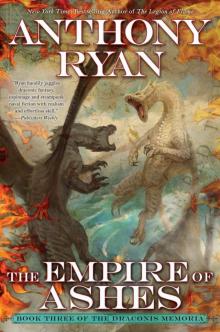 The Empire of Ashes (The Draconis Memoria)
The Empire of Ashes (The Draconis Memoria)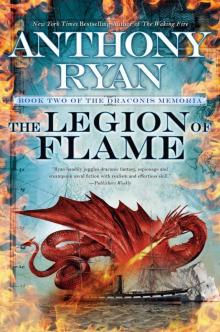 The Legion of Flame (The Draconis Memoria)
The Legion of Flame (The Draconis Memoria) Slab City Blues: A Song for Madame Choi
Slab City Blues: A Song for Madame Choi